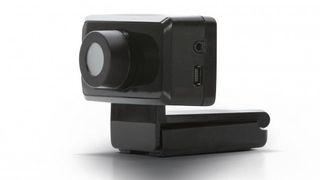Oculus Rift Development Kit 2 on sale now, an even better consumer version is "the next step"

A new model of the Oculus Rift Development Kit—simply called Development Kit 2 or DK2— is available for pre-order today for $350 with an estimated shipping date of July. Compared to the original virtual reality headset prototype, Development Kit 2 has a higher resolution screen (960x1080 per eye), generates no motion blur, and includes positional head tracking using a CMOS sensor.
Positional head tracking means that, rather than just tracking head rotation, it also tracks the head's movement in space relative to a starting point. Leaning forward or moving laterally in the original prototype, for instance, would cause the world to feel like it's stuck to your face, while the new headset translates those motions into movement in the virtual world.
The new kit is similar to the Crystal Cove prototype Cory tried at CES. I also tried one here at GDC 2014, and it's a vast improvement. The motion blur is almost totally gone, which is a great relief after seeing how worlds smear when turning your head in the original prototype. A screen door of pixels is still visible, but the resolution is close to—or possibly at—where it needs to be for a consumer model. Text is now sharp enough to read clearly without strain, for instance, which is a necessary step forward.

Also necessary is the positional head tracking. I don't like that it requires a camera—I appreciated that the Rift was originally self-contained so I could use it anywhere I could run a cable to—but the concession is worth it. I leaned over and peered into a game board in Epic's Elemental Defense demo, and it felt absolutely natural. I also saw it used, along with the internal sensors, to translate head movement into character movement in a two-player demo—when my opponent was looking at me, he was looking at me. It was terrifying in a good way.
The only problem was that if I leaned over too far, it lost sight of my head and had to estimate where I was. It did a pretty good job of it, but the wold sometimes snapped back into place when the camera could see me again—that might be solvable with software. For more on the DK2 demos, read Sam's hands-on impressions .
So where's the consumer version?
As for the consumer version, it's "the next step," says Oculus VR CEO Brendan Iribe, speaking to me at Oculus' GDC demo space in San Francisco yesterday.
"Development Kit 2 has the core building blocks ... [The consumer version] is going to improve all of these things to where it all gets very comfortable. The second developer kit is not designed for hours of use, but it has those core pieces. So, we put this out, developers can get started with this, and they can take the content that they make with DK2 and they'll be able to jump it over to the consumer version with little to no code changes."
PC Gamer Newsletter
Sign up to get the best content of the week, and great gaming deals, as picked by the editors.
Though non-developers can buy one of the new dev kits, Iribe stresses that the consumer version will be much better. He wouldn't go into specifics, but according to Iribe, every part of the experience is improved: the screen, the tracking, the design. Oculus does have internal prototypes of that version, and Iribe tells me that of the few hundred people who have tried one—including some of his more skeptical friends—not one has left with doubts about it.
"I'm confident that consumer VR version one from Oculus is going to deliver on the promise," says Iribe. "It is going to be what people have imagined VR to be for so long. Dev Kit 2 gets us closer to that, but when you see the actual consumer prototype, which we now do have internally, you just get it. People say, 'Oh my God. I realize how big this is going to be. It's really going to work.'"
Oculus won't commit to a release date for the consumer version, except to say that it will be before the end of next year. I got the sense that with a prototype built and talks with manufacturers underway, it could very well be this year. Iribe also mentioned that Oculus will have a very large presence at E3—a booth not quite as big as Microsoft or Sony's, but big enough to put Oculus in the same league—and that, I think, would be a sensible time to make a release date announcement.

Tyler grew up in Silicon Valley during the '80s and '90s, playing games like Zork and Arkanoid on early PCs. He was later captivated by Myst, SimCity, Civilization, Command & Conquer, all the shooters they call "boomer shooters" now, and PS1 classic Bushido Blade (that's right: he had Bleem!). Tyler joined PC Gamer in 2011, and today he's focused on the site's news coverage. His hobbies include amateur boxing and adding to his 1,200-plus hours in Rocket League.
Most Popular






